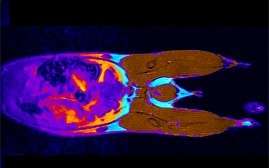Lower body and extremities of a mouse in the magnetic resonance tomograph: In the false colour image, fat tissue is highlighted in blue and the muscles in brown. Credit: MPI for Heart and Lung Research
Muscles consume a large part of the body's energy. Hence when fat metabolism in muscle cells is impaired, the organism gains weight. Scientists from the Max Planck Institute for Heart and Lung Research in Bad Nauheim have discovered that a regulatory circuit for an oestrogen receptor in muscle cells only controls fat metabolism in male mice. The receptor is regulated by an RNA molecule known as miR-22. If this molecule is lacking, more receptor molecules are formed and the animals lose weight as a result, however this only happens in males.
The scientists led by Thomas Böttger from the Max Planck Institute in Bad Nauheim deactivated the RNA molecule miR-22 in mice using genetic engineering. "The males formed less adipose tissue and gained less weight than mice in which miR-22 is still active. This would indicate that miR-22 is important for the regulation of lipometabolism," says Thomas Böttger. However, the mutation does not have any effect on the weight of female animals.
Further experiments showed that miR-22 controls the oestrogen receptor: in mice that lack active miR-22, the muscle cells form more receptors. "The more oestrogen receptor molecules in the muscle cells, the less fat tissue formed. The reason for this is the higher energy consumption of the animals' muscle cells," explains Böttger. Accordingly, the muscles play an important role in an organism's energy balance.
The Max Planck Scientists also succeeded in answering the question as to why miR-22 has no effect on the oestrogen receptor and weight of female mice: the receptor is basically more active in females. "For this reason, it suppresses the emergence of active miR-22 molecules in the female of the species, and the activity level of the receptor remains high. As opposed to this, in the males, miR-22 limits the amount of oestrogen receptors in the muscle tissue and in this way reduces the breakdown of fat," says Böttger.
This difference between the sexes could also be of medical significance: "It may be possible to reduce the formation of fat one day and hence help to prevent obesity by increasing energy metabolism in muscle cells," says Böttger.
More information: Judith Schweisgut et al. Sex‐specific, reciprocal regulation of ERα and miR‐22 controls muscle lipid metabolism in male mice, The EMBO Journal (2017). DOI: 10.15252/embj.201695988
Journal information: EMBO Journal
Provided by Max Planck Society






















